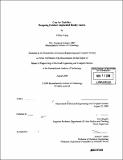Case for usability : designing Outdoor Augmented Reality games
Author(s)
Wang, Tiffany (Tiffany N.)
DownloadFull printable version (53.86Mb)
Alternative title
Designing Outdoor Augmented Reality games
Designing OAR games
Other Contributors
Massachusetts Institute of Technology. Dept. of Electrical Engineering and Computer Science.
Advisor
Eric Klopfer.
Terms of use
Metadata
Show full item recordAbstract
Creating a successful Outdoor Augmented Reality (OAR) game can be a complicated process. With every new feature added to the OAR toolset, games gain more levels of complexity, grow in size of content, and become increasingly difficult to produce and manage. In order to identify plausible methods to help alleviate some of the difficulties when creating OAR games, a heuristic usability evaluation of the existing Game Editor toolkit and an assessment of the needs of game designers were made as part of this research. Two new applications, the Desktop Editor and Remote Editor, were designed, prototyped, and evaluated by new and experienced game designers. The Desktop Editor offers new methods of visualizing and working with data which have proven to be useful features for creating games but also add difficulties to overall learnability. The Remote Editor offers on-location game editing capabilities which help expedite many of the tasks involved with creating and testing OAR games. Feedback and user tests suggest that the new applications offer valuable ideas for game editing features that would be beneficial in future iterations of the OAR Game Editor toolkit.
Description
Thesis (M. Eng.)--Massachusetts Institute of Technology, Dept. of Electrical Engineering and Computer Science, 2008. Pages 95-96 blank Includes bibliographical references (p. 87-88).
Date issued
2008Department
Massachusetts Institute of Technology. Department of Electrical Engineering and Computer SciencePublisher
Massachusetts Institute of Technology
Keywords
Electrical Engineering and Computer Science.